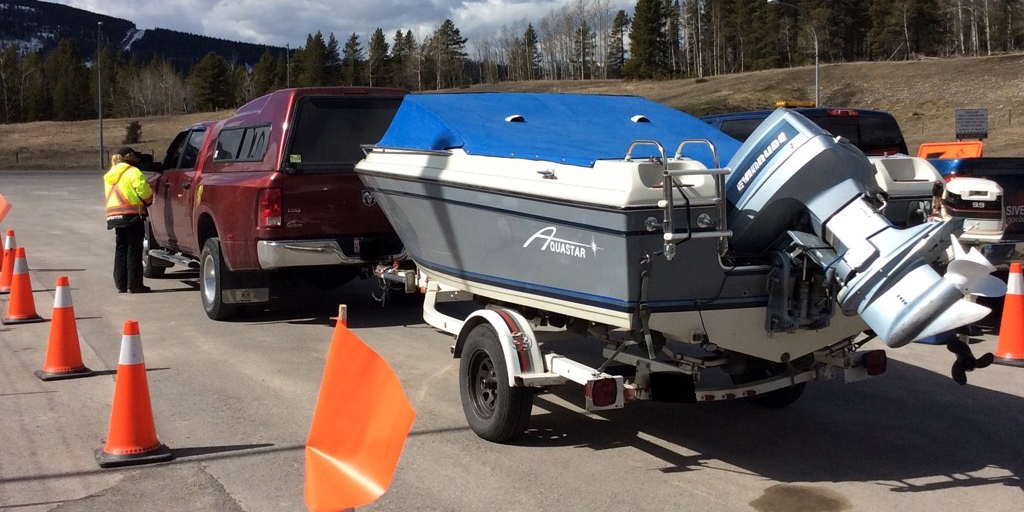Bringing your boat with you into BC this season?
Quagga and Zebra mussels can be a serious threat to BC’s waterways and if you are planning on bringing your boat with you when you visit the Columbia Valley, you need to know about these nasty little critters. Why is that? Well, if you are coming from outside the province, you may be surprised and a little alarmed to be stopped at an inspection station as you cross the border into BC from Alberta or the US. Don’t panic!

As you pull to a stop, consider the inspector who greets you to be a health inspector. He or she is checking to see if your boat and all your water equipment (skis, boards, paddles, etc.) are clean and free of a contagious infestation of quagga and/or zebra mussels.
Here’s the story …
Back in the 1980s, Canada, in the region of the Great Lakes, and the US received an invasion of quagga and zebra mussels from Europe. Neither is native to North America and thus, both are considered to be invasive species. They are highly contagious and have become a serious threat to the health of all our country’s waterways. Once they are introduced into a lake, river or stream, they quickly, irreversibly and catastrophically damage that waterway and are then transported to others, often on boats and equipment that come into contact with the contaminated water.
What you need to know about these nasty invaders:
- Zebra mussels (Dreissena polymorpha) and quagga mussels (Dreissena rostriformis bugensis) arrived in ballast water which was discharged by vessels arriving from Europe
- The invasive mussels are a severe danger to our ecosystems and clog water intake pipes which result in higher maintenance costs for all our water, including hydroelectric, domestic, industrial, agricultural and recreational. Consumers are the ones who foot the bill (to the estimated tune of $43 million per year, not including commercial or recreational fisheries)
- The mussels rapidly reproduce once introduced into a lake or river, devouring the food required by the native plants, animals and fish. There is a risk that the ecosystem will ultimately no longer support the life within the waterway.
- Quagga and zebra mussels have not yet found their way into BC
Preventive Action
The Province of British Columbia’s Ministry of the Environment has declared war on these mussels, undertaking a pilot project in 2015 and establishing the Mussel Defense Program in 2016.
Part of that program includes the establishment of eight permanent inspection stations which are situated at major entry points along BC’s Alberta and United States borders. The BC effort co-ordinates with those of the neighboring jurisdictions of Washington, Oregon, Idaho, Montana, Alberta, Saskatchewan, Manitoba and Yukon in a joint effort to keep the critters out of these areas.
- You MUST stop at the inspection station. Failing to do so will result in a ticket.
Some interesting stats
Here’s what the inspection stations reported about the 2016 boating season’s findings:
- 24,500 watercraft were inspected for invasive quagga and zebra mussels
- Of those, 683 came from high-risk provinces or states
- 17 were confirmed to have adult mussels
- 14 of those came from Ontario with one each from Manitoba, Michigan and Nevada
- 92 decontamination orders were issued
- 46 tickets and 36 warnings were issued to motorists failing to stop at the inspection stations
- In efforts to educate the public, a “Clean, Drain and Dry” message has been promoted to more than 49,000 people. http://bcinvasives.ca/resources/programs/clean-drain-dry
Help BC keep the mussels out!
It only takes the arrival of one boat with an infestation of quagga and zebra mussels to start an invasion that will have irreversible consequences.
You can help us keep the Columbia Valley and the Province of British Columbia clean and clear of these invasive species. If you are planning to bring your watercraft into BC this season:
- Before you leave home, clean the boat, trailer and all other equipment of aquatic animals, plants and mud
- Completely drain the bilges, ballast tanks, engines and live wells
- Make sure the boat is completely dry
Please report any mussel-affected boats to the Report All Poachers and Polluters (RAPP) toll-free hotline at: 1 877- 952-7277.
You can learn more about the Clean, Drain, Dry program and also the Invasive Species Council of BC at: http://bcinvasives.ca/resources/programs/clean-drain-dry
In the Columbia Valley of BC, the East Kootenay Invasive Species Council (EKISC) works at a regional level to educate the public and implement the programs of the parent council. Visit: http://ekisc.com/invasive-species to learn more about invasive species, both on land and water.
Even closer to home is the Lake Windermere Ambassadors who monitor Lake Windermere regularly for invasive quagga and zebra mussels. See their website at: http://lakeambassadors.ca
Note: ColumbiaValley.com is grateful to the BC Government Ministry of the Environment for the information and images provided for this article.
